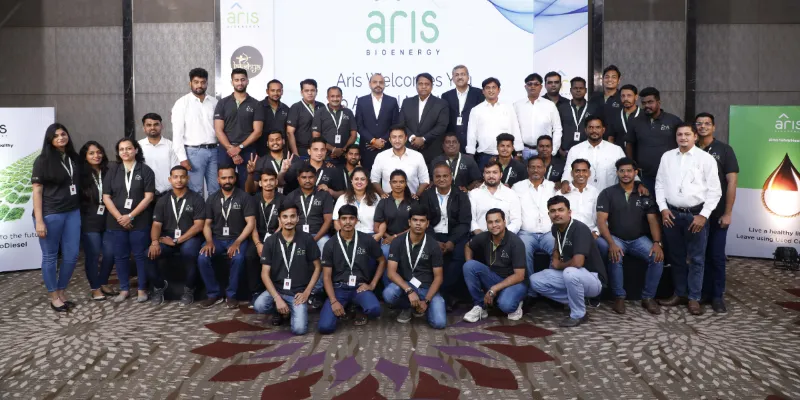How Mumbai-based ARIS BioEnergy is helping convert used cooking oil from 27,000 eateries into biodiesel
Founded by Umesh Waghdhare, ARIS BioEnergy collects used cooking oil from eateries across Mumbai, Nagpur, Nashik, Kolhapur, and Karnataka, and sells them to refineries to convert into biofuel. This year, ARIS is planning to set up a refinery of its own.
Did you know that the oil used by your local restaurants is extremely harmful to your health? Moreover, there is a guideline in place regarding used cooking oil, which is often flouted by the owners of these eateries.
According to a report by Statista, India consumed an estimated volume of over 22 million metric tonnes of vegetable oils in the FY21. However, according to the mandates issued by the Food Safety and Standard Authority of India (FSSAI), used vegetable oil develops more than 25 percent of the total polar compounds that cannot be used for frying.
But how many companies and businesses are adhering to this norm? Not many, says entrepreneur and Founder of Mumbai-based , Umesh Waghdhare. In addition, he highlights that if the used cooking oil (UCO) is not reused, it is often drained out in water bodies, which harms the environment enormously.
Before 2019, Umesh was planning to set up an ethanol factory in Maharashtra. However, after attending an event in Delhi commemorating World BioFuel Day, he realised that a business opportunity in this segment exists which should be explored.
“We thought of developing an aggregation system where the used cooking oil is collected and converted into biodiesel,” he tells SMBStory.
He set up ARIS BioEnergy in Mumbai in January 2019 to start the aggregation process. It tied up with local eating joints in and around Mumbai to buy used cooking oil. It then sells it to refineries who are enrolled with FSSAI to process it into biodiesel.
The team says converting UCO into biofuels doesn’t just benefit the environment but is also aimed at solving several problems for the economy. “The biodiesel after conversion can be blended with conventional diesel which will result in import substitution and reduction of carbon emissions,” Umesh explains.
The pre-pandemic story
According to a report, approximately, 2,700 crore litres of cooking oil is used in India annually, out of which 140 crore litres can be collected from bulk consumers such as hotels, restaurants, canteens, etc for conversion, which will give approximately 110 crore litres of biodiesel in one year.
Umesh says it was difficult to convince people to discard UCO after crossing the benchmark. “Although we showed FSSAI guidelines to the outlets, we realised they were not ready to get rid of the used cooking oil,” he says, adding, “Moreover, they tend to keep adding fresh oil into the used oil and use it again.”
He also adds that the team faced some resistance initially. “Some people did not agree with us saying that they didn’t receive any such guidelines,” he explains.
He says that carrying out promotional activities, audits and with the government tightening the noose when it came to implementing the guidelines played a role in changing the perspective of this segment and getting more owners to register with ARIS.
Umesh and his team also developed a logistics application with the help of Bengaluru-based startup, which ensured seamless first-mile pickups of UCO from eateries.
“Once an outlet gets registered with us, it gets tagged to a geographical location. The planning of manual collection is done through the software. The application also helps us decipher the areas being covered for collecting the oil,” he explains. “The application generates notifications when the collected oil reaches our warehouses and then leaves them to reach the oil refineries.” The used cooking oil is then converted into biodiesel in these refineries.
ARIS BioEnergy claims to have facilitated the conversion of around 9 lakh kgs of UCO into biodiesel between April 2019 and January 2020, covering regions like Mumbai, Nagpur, Nashik, Kolhapur, Karnataka, Goa, Telangana, and more.

ARIS BioEnergy Team
Operating amid the pandemic
At the beginning of 2020, ARIS BioEnergy was gearing up to set up a refinery of its own in Mumbai to convert UCO into biodiesel. However, when the COVID-19 pandemic struck in March 2020, the business had to completely halt its operations. ARIS also formed a joint venture with Green Fuels, a UK-based biofuels company, to set up refineries in India in the beginning of 2020.
Moreover, the lockdown forced many eateries to shut shop, which further contributed to the woes of the company as they were the primary stakeholders.
“However, we stayed in touch with our employees and also onboarded several new ones,” Umesh recalls.
Umesh says his team also mapped the outlets that were shut and identified new ones which could be registered. It also registered manufacturing companies and corporates such as Haldirams and Rebel Foods for collecting UCO.
“We faced a lot of challenges but it was only a matter of time until the business stabilised and we started recovering to the pre-pandemic levels,” he adds.
Though Umesh doesn’t reveal the revenue figures, he adds that the aggregation business is growing at a pace of 15-20 percent quarter-on-quarter. Today, its network has also grown to 27,000 outlets across the country.
Going forward, the company plans to set up a biodiesel plant by the end of this fiscal year, as well as 20 refineries under ARIS Greenfuels in the long term. It also plans to expand its aggregation business model to Kolkata and Delhi-NCR over the next few months.
ARIS’ long-term goal is also to produce large quantities of biofuel which can be used in the aviation sector.
Edited by Kanishk Singh









